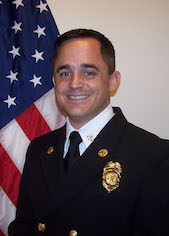From the CPSE Vault…
by Deputy Chief Holger Durre, CFO
The fire service is changing more rapidly now than it has in its existence. If your ears aren’t perking up with regard to the influence that the changing environment is playing, I would ask you to unbuckle your radio strap, postpone your next Web surfing for the fire videos, and tune in long enough to listen to the winds of change. They are prevailing, and they will be with us as long as any of us serving in this profession will be around for. For instance, the role that pre-hospital medicine, data analysis, and the science of fire behavior are playing is just the tip of the iceberg. These are just the “appetizers” to the dinner party we have been invited to. Understand and know that these issues already have, and will, change our industry profoundly in the years to come. However, as a culture, we have a significant blind spot that has the potential to impact our constituents if we don’t look over our shoulders.
The problem is that we continue to come up with reactive and response-based solutions to the need that our communities ask us to solve. As proof, dust off the mission statement of your organizations. Usually, fire service organization mission statements boil down to this: “If you have a problem, we will respond, lights and sirens, to solve it and give you a hug to make it alright.” This isn’t bad at its core. But if you need more proof, think of this. Every fire department is able to tell you the number of runs they had last year. It’s a badge of pride. Just think of the swagger that the “busiest” company in your organization presents itself with. By doing this, we celebrate the misfortune of the very citizens we are dedicated to protect. This is ultimately our collective fault.
However, I would offer a concept to challenge that thinking. Is this very mentality simply serving our own need to be needed? Do we, as an industry, focus on response times, task level competence, and specialization so much that we blind ourselves to the potential service delivery we offer to our communities? And is this mentality ultimately weakening our ability to meet the needs of our communities?
Unapologetically, I will offer that our need to intercede when things go bad cannot, and should not, ever go away. Our personnel need to be ready, skilled and “battle-ready” to rescue those we have sworn to protect from harm. But this should never occur at the cost of our actual duty. We are here to protect our communities from the impact of the worst. We are the subject matter experts that our communities rely on to provide an answer when the unthinkable occurs, which means we know instinctively that what we do is not a matter of if, but when.
The unthinkable to the community is, in most cases, the predictable to us. If you don’t believe me, look at your agency’s last annual report. Was it any surprise to you that structure fires occurred in your jurisdiction at a rate similar to the year prior? Were you shocked to find that low-acuity medicals increased in your jurisdiction? And, in some cases, was it really earth-shattering that yet another community that was built in the urban interface was overrun by a massive wildfire?
We need to reimagine what duty, courage and commitment mean to those we serve. Before you break out in hives at the thought of carrying a code book, please know this. The National Institute of Standards and Technology (NIST) studies have proven that it takes one heck of a fire department to respond to a modern building with modern furnishings to intercede prior to flashover. Yet, despite our collective realization of these facts, we continue to solve the problem by applying “Plan A” harder.
The time has come for us to fix this. How do we do this? Quite simply by focusing on the risk our citizens face rather than the incidents we respond to. Study your community diligently and with the same sense of duty, courage and commitment that we tackle our response work with. Please understand unequivocally that I am not proposing shifting every front line firefighter to the fire prevention bureau of your organization. Quite the opposite. I am simply challenging the fire service to change its value system. It is our culture that rewards valor, even when we make stupid decisions, based on an event occurring. Unfortunately, and subconsciously, that means we intrinsically value an event to occur over our customer ever getting in a tough spot in the first place.
But what if we actually took our role seriously to protect the community beyond the scope of response and shifted to risk reduction as the primary value of our community? This idea isn’t new. The National Fire Academy was established on the very concept when America Burning was published. Yet, we continue to repeat the same self-centered pattern at the cost of increasing our response capabilities alone.
The bottom line is: Know your risk – and not the Chicken Little version but the Gordon Graham version. The sage of risk reduction in our industry got it right: Predictable is preventable. But we need to stop limiting that thinking to just ourselves when we hear this. We need to expand the idea to the communities we are sworn to protect. Start by valuing risk reduction, then build a comprehensive solution to address that risk.
Each community is different, so adapt. But whatever you do, for once, don’t just do something (respond) and stand there (assess). Do a 360 of your community before the emergency ever reaches your PSAP. Be a responsible leader in public safety. That very term implies that we are duty bound to keep our communities safe. Do this with the same passion you invest in your primary search techniques as you do in partnership with your homeless shelter to direct individuals to social services. Put the same energy into your company inspection as you do into your technical rescue training drill. Get out of your comfort zone and know that the community will always need us. This is not an existential crisis; it’s a lack of situational awareness on our part. We’re experts at situational awareness; use this strategically and communitywide, not just on a call-by-call basis. And finally, change your attitude from reaction to proaction. Bad things will always happen, but we already know that. It’s time we stopped reacting to our community’s crises and get involved in being proactive by implementing a system built on comprehensive risk reduction. And that starts by honestly understanding the potential risk in our community and then proactively mitigating that risk through assessment and intervention.
I’ll leave you with this: The father of the American fire service, Benjamin Franklin, said that “an investment in knowledge pays the best interest.” It is time we invested in using our knowledge based on being proactive. The citizens we serve deserve this act of fundamental courage. It’s time to get to work.

